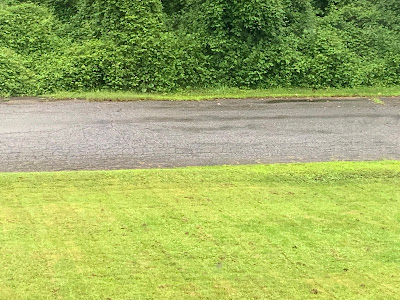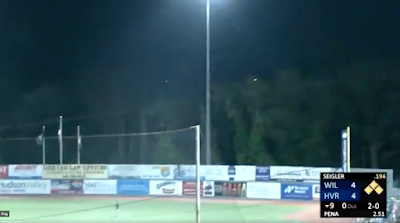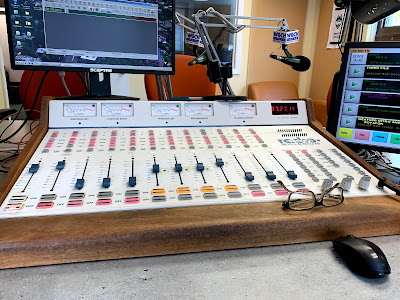 |
| You'll be better for all of it |
Taking a break from game-prepping for tonight when Brooklyn comes to Dutchess Stadium for the first time.
Bouncing off last night's post, I found myself thinking about the number of young broadcasters trying to wedge their way into the crowded world. There are those who have the "leg up" of the broadcast schools of prestige (Syracuse, Fordham, AZ State, and Mizzou all come to mind) and the grunts who will try their luck in the smaller outlets.
I think we've actually done these students (and now former students) a disservice by treating them with...ahem...kid gloves.
When anyone -- regardless of age -- interns with me or asks me for advice or mentorship, they get the full treatment. Whether it was Matt Hamilton as a kid or Chris Kaelin as a man or anyone else, I broke their work down. I was hard on them, critiqued them, and I'd like to think I helped make them better in the long run.
Yet, for some reason, if there's criticism, it falls into the category of being "just a kid."
Why?
The criticism -- which sucks -- made me better, and nobody is a harsher critic of my work than I am. At this point, I sort of laugh at it because I'm probably ten miles ahead in terms of already criticizing myself.
Several weeks ago, I saw a broadcaster in Connecticut get criticized for the use of a term. We'll circle back to that. A Twitter user jumped in to call out the critic not long after because the young broadcaster was working on their craft.
That point was both fair and unfair. If they're getting things blatantly wrong (left field versus right field, the score, the wrong batter -- hi! -- then it can be corrected, albeit politely).
I've coached students to always be sly in making those corrections. For instance, if calling someone the wrong name, the other person in the booth can simply use the correct name immediately. Most -- me included -- will pick up on the mistake and move along.
There's also the old write it on a piece of paper and show it to the person, or point to something on the roster. When that all fails, mute the mics and get it right. But never embarrass each other.
These young broadcasters should welcome the criticism, as they should believe in getting it right. More importantly, some of them aren't new anymore.
Plus, as I alluded to last night, the wolves will be out as soon as high school is over. College professors, fans, social media jerks, and others will now be on you.
It can't all be just praise. I received a ton for the Renegades work so far, and the comments on the FCIAC baseball championship call meant the world to me. But...as far as I was concerned...I was terrible in the last Gades broadcast. I have to call it as I see it, and get back to doing better tonight.
In the process, because I was honest and open, people were supportive and understanding. Now we move on.
However, the criticism that I alluded to above -- regarding the choice of a term -- was completely wrong.
A quick review of the critic's Twitter page spoke like a manual for a person that you probably wouldn't want to be around -- especially where women's sports are involved.
She had a problem with the use of the word "faceoff" during a girls lacrosse game. Now, to be totally fair, women's lacrosse is a different game for sure from men's. And, yes, "draw" is the correct term, however, other than this...er...individual, faceoff is not a fatal mistake.
I realize this is a sticky subject. Don't use anything other than "circle" when talking about a pitcher's location in softball, for instance.
In hockey, of course, the terms faceoff and draw are used interchangeably. I should know, given I've called a few hockey games.
In fact, a quick Google search indicates that some do use both terms in women's lacrosse.
What made the criticism so harsh was how it was delivered.
Gee.
She seems like joy, doesn't she?
It was sent to nine accounts, including the broadcaster and several media outlets, as well as the school. That's where the person calling out the critic was completely correct because it was harsh and unnecessary, especially in such a public forum.
There is legit criticism that should be given. Saying you're going to do a game and not showing up, especially because you decided to go to the Yankees game or something else? Yeah, that should be called out.
Shoddy work by an analyst stepping all over the play-by-play call? Yes. I've seen it, heard it, and experienced it. I had it happen just a few weeks ago.
But it's also in how it's delivered.
I still remember the baseball game I did alone -- probably 2015 -- where a St. Joseph student didn't like my call and posted it on Twitter. Instead of running, I wrote back and wondered if he'd like to specifically tell me what he didn't like.
The tweet was deleted seconds later.
I have no doubt most of the broadcasters will be better at what they do for dealing with this stuff in the long run.
Let the criticism -- polite, legitimate criticism -- be heard. Remember: in broadcasting, unless it's on tape, there's no delete key. Most of my print, multi-media peers have the ability to edit. We don't when it's live.
Let the kids be kids, of course.
But keep it real.






































